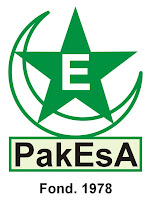Je la nomo de Allah, la donema, la pardonema.

Centra Oficejo:
Pakistana Esperanto-Asocio (PakEsA)
Esperanto Markaz, Chowk Shahidan, Multan, Pakistano.
pakesa@hotmail.com
What is Esperanto?
Esperanto (
اسپرانتو ) is the world's most spoken constructed international auxiliarylanguage. The language of Esperanto, meaning ''one who hopes'', was created by L. L. Zamenhof in 1887 to be an easy to learn international language with the intent of it being a universal second language that rises above the segregation of politics, religion, regions, nationalities, and transcends national borders to promote peace and universal communication.
Esperanto is spoken in about 115 countries, has over an estimated 1 million speakers,
and is even learned as a native language.
Although Zamenhof's full intent of being a world second language has not been reached, today Esperanto is learned to help aspiring polyglots get further ahead in their target language by spending some time learning Esperanto first prior to proceeding on to additional languages. As an adult learner we learn languages differently than a toddler.
The hardest language for us, then, is our second language (assuming we only learned
one native language growing up). Therefore, spending a few weeks learning an easy
language such as Esperanto then gives us the courage and experience to move on to
our third language (may it be French, Spanish, Russian, etc.). It is getting over the hurdle of tackling that second language as an adult learner that stumps so many of us.
Founder of Esperanto, Ludwig Lazarus Zamenhof, was a Polish ophthalmologist and polyglot. He began creating an International language in the mid 1800's. He grew up speaking Russian, Yiddish, Polish, and German. Mr. Zamenhof then went on to learn French, Latin, Greek, Hebrew, and English, with an interest in Italian, Spanish and Lithuanian. He was nominated for the Noble Peace Prize in 1910 and died in 1917.
Lest anyone think Esperanto is something dead or historical, you might be interested to know of Esperanto’s current popularity which is 125 years young in 2012.
ReplyDeleteTheir new online course http://www.lernu.net has 125 000 hits per day and Esperanto Wikipedia enjoys 400 000 hits per day. That can't be bad :)